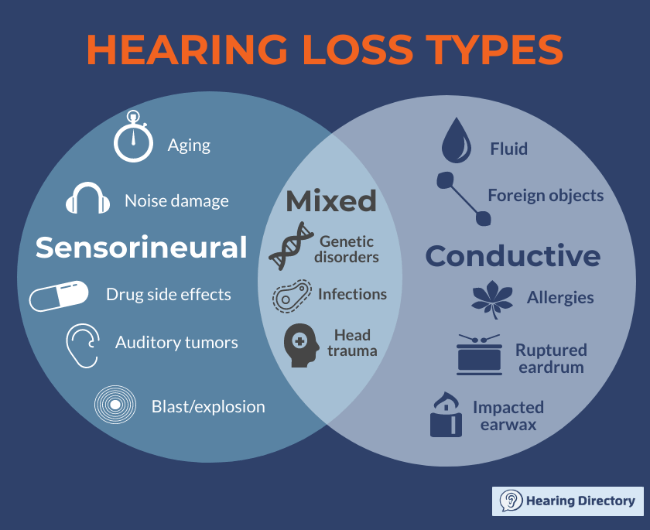|
www.HearingDirectory.ca |
Types of hearing loss
By Julie Harris, CPA, CA, HIS, Hearing Instrument Specialist Last updated on: January 27th, 2025 There are three common types of hearing loss: sensorineural, conductive and mixed. It’s important to know what type of hearing loss you have to receive the best treatment. Key points:
Hearing loss affects people of all ages. Statistics Canada reports one in five Canadians experience some degree of hearing loss. This can arise from different causes. Hearing loss impacts the quality of life for you and your loved ones. Researchers have linked hearing loss to fatigue, social isolation and depression. The good news? Help is available. Book a hearing consultation and see which options are available to you. What type of hearing loss do you have?
are caused by different types of hearing loss. Hearing loss of any kind can affect one or both ears and range from mild to profound in severity. There are three main types of hearing loss based on the location where it occurs:
What is sensorineural hearing loss?Sensorineural hearing loss is a result of damage to the inner ear or auditory nerves that deliver sound to the brain. Inside the inner ear is a snail-shaped organ called the cochlea. Inside the cochlea are tiny hair cells that detect sound waves. They then convert the waves into electrical impulses. The hair cells and the nerves can become damaged, leading to permanent sensorineural hearing loss. It is the most common type of hearing loss. CausesSensorineural hearing loss is most often a symptom of aging. It can also occur from exposure to loud noise, both sudden and long term. This is known as noise-induced hearing loss. Other causes of sensorineural hearing loss include:
SymptomsSensorineural hearing loss typically causes a reduced ability to hear sounds. It can also reduce clarity of speech. This kind of hearing loss affects the volume and pitch of sounds you hear. A common type of sensorineural hearing loss is high-frequency hearing loss, which makes it harder to hear high pitches, such as kids' and women's voices. Common signs that you may be experiencing sensorineural hearing loss include if you:
TreatmentYou can treat age-related and noise-induced hearing loss with hearing aids. Hearing loss from viral or bacterial infections can sometimes be treated with the timely use of medication. If hearing aids are not able to overcome damage in the inner ear or auditory nervous system to help you hear well, cochlear implants may be an option. You cannot avoid age-related hearing loss, but you can prevent noise-induced hearing loss. Use good quality ear plugs or earmuffs when in loud background noise to protect your hearing health. What is conductive hearing loss?Conductive hearing loss occurs in the outer ear and/or middle ear. This includes the ear canal, ear drum, and the middle ear bones. Conductive hearing loss may be temporary or permanent, depending on the cause. 
are common with conductive hearing loss. CausesA physical blockage causes conductive hearing loss. It prevents sound from travelling from the outer and middle ear to the inner ear. It can also happen if the ear drum or middle ear bones to not properly function. Common conductive hearing loss causes are:
SymptomsConductive hearing loss will cause a reduced ability to hear sound, but not clarity. Often, you may experience a sensation of fullness or "plugged" ears along with tinnitus. If an infection is present, pain or drainage may also occur. TreatmentYou can treat conductive hearing loss or reverse it all together. Treatment can include:
Hearing aids are often effective when the hearing loss is irreversible. Bone-anchored hearing systems also may be a good option. What is mixed hearing loss?Mixed hearing loss is the presence of both sensorineural and conductive hearing loss. It occurs in the inner ear and/or auditory nervous system and the outer and/or middle ear. CausesCauses are a combination of sensorineural and conductive hearing loss causes. For example, a person with age-related sensorineural hearing loss with earwax blockage. SymptomsSymptoms include a reduced ability to hear sounds. This includes reduced clarity in understanding speech. Other symptoms can include:
TreatmentTreatment often starts with addressing the conductive component of the hearing loss. This can include antibiotics, removal of excess earwax, or surgery. Next, your hearing professional may prescribe hearing aids to treat the remaining symptoms. A hearing test can help determine what type of hearing loss you have. How to get helpThere are several factors that can contribute to hearing loss. You can reverse some of the causes or conditions, but most often, hearing loss is permanent. You can treat hearing loss with prescribed hearing aids or other options. In children, untreated hearing loss can lead to communication disorders. If you are experiencing any symptoms of hearing loss, a hearing professional may give you a hearing test. He or she can also discuss the best treatment options for you. Julie Harris, CPA, CA, HIS, Hearing Instrument Specialist
You are reading about: Related topics
More information about hearing aids. Featured clinics near me
Schedule a hearing test with Healthy Hearing. Find a clinicThe Healthy Hearing Report |
|
www.HearingDirectory.ca |
Types of hearing loss
By Julie Harris, CPA, CA, HIS, Hearing Instrument Specialist Last updated on: January 27th, 2025 There are three common types of hearing loss: sensorineural, conductive and mixed. It’s important to know what type of hearing loss you have to receive the best treatment. |
 Are you located in the United States?
Are you located in the United States?


 Contributing author Julie Harris is a Hearing Instrument Specialist for a private hearing clinic in Kitchener, Ontario. Julie sees the impact hearing loss has on people's everyday lives and is passionate in supporting them in achieving better quality of life through good hearing healthcare. Julie graduated from Conestoga College's Hearing Instrument Specialist program as a member of the President's Honours List and has taught as a part-time instructor for the program. Julie enjoys many outdoor activities including gardening, hiking, camping and exploring Ontario beaches and parks with her husband and two children.
Contributing author Julie Harris is a Hearing Instrument Specialist for a private hearing clinic in Kitchener, Ontario. Julie sees the impact hearing loss has on people's everyday lives and is passionate in supporting them in achieving better quality of life through good hearing healthcare. Julie graduated from Conestoga College's Hearing Instrument Specialist program as a member of the President's Honours List and has taught as a part-time instructor for the program. Julie enjoys many outdoor activities including gardening, hiking, camping and exploring Ontario beaches and parks with her husband and two children.